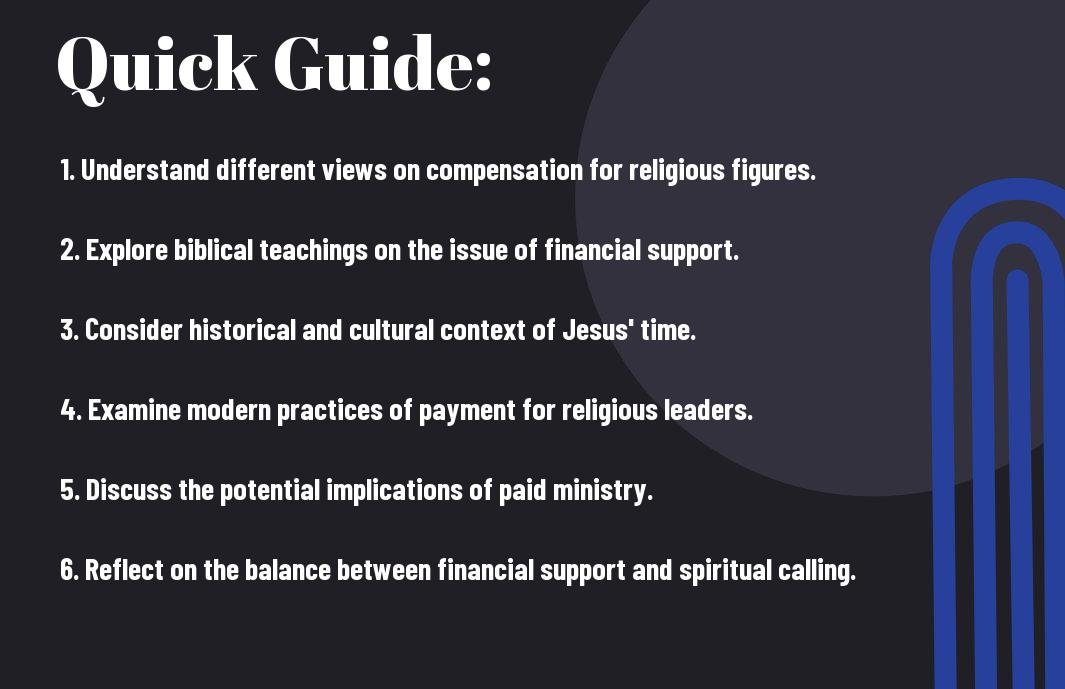Unraveling the intricate financial aspects of ministry can be a daunting task, but it is crucial to gain a comprehensive understanding of how finances played a role in the life of Jesus and his disciples. In this guide, I will delve into the question of whether Jesus received payment for his preaching and teaching, and examine the implications of financial support for those in ministry. I will also explore the dangers and temptations that come with money in ministry, as well as the positive impact that proper financial management can have on the spread of the gospel. By the end of this post, you will have a clearer perspective on the financial dynamics of ministry and how it relates to the life and teachings of Jesus.
Key Takeaways:
- Jesus did not receive payment for preaching – There is no evidence in the Bible that Jesus received money or any form of compensation for his preaching and ministry.
- Financial support for Jesus’ ministry – Jesus relied on the financial support of others, including women who provided for him out of their own means (Luke 8:1-3).
- Biblical teachings on money and ministry – The Bible emphasizes the importance of generosity, stewardship, and the ethical use of money in the context of ministry and serving others.
- Contemporary implications for financial aspects of ministry – This exploration sheds light on the modern-day debate about the role of money and compensation in religious and spiritual leadership.
- Emphasis on spiritual rewards over financial gain – The focus of Jesus’ ministry was on serving others and spreading the message of love and salvation, rather than financial gain.
Types of Financial Aspects in Ministry
The financial aspects of ministry can be categorized into various types, each playing a crucial role in sustaining the work of the ministry. Below is a breakdown of the types of financial aspects commonly associated with ministry:
| 1. Tithes and Offerings | 4. Church Funding |
| 2. Speaking Fees and Honorariums | 5. Personal Support |
| 3. Book Sales and Merchandise |
Tithes and Offerings
Tithes and offerings are a fundamental part of the financial aspect of ministry. Tithing is the practice of giving a portion of one’s income to the church, typically 10%, and it is rooted in biblical teachings. The offerings, on the other hand, are voluntary contributions beyond the tithe. These financial contributions play a crucial role in supporting the work of the church and its ministries.
Speaking Fees and Honorariums
Speaking fees and honorariums are another important aspect of ministry finances. Speaking fees are payments received for speaking engagements, conferences, or events. On the other hand, honorariums are voluntary payments offered to a speaker as a gesture of appreciation for their time and service. These financial resources can provide support for the minister and contribute to the sustainability of the ministry.
Tips for Managing Finances in Ministry
Clearly, managing finances in ministry can be a challenging task. However, it is essential for the sustainability and growth of your ministry. Here are some tips to help you effectively manage your finances:
- Develop a clear budget that outlines your income and expenses.
- Seek out professional financial advice to ensure you are making sound financial decisions.
- Practice good stewardship by regularly reviewing and adjusting your budget.
- Consider implementing multiple streams of income to support your ministry.
After implementing these tips, you will be better equipped to effectively manage the financial aspects of your ministry.
Budgeting
Budgeting is a key aspect of managing finances in ministry. It allows you to allocate funds to different areas of your ministry, including outreach, staff salaries, and operational expenses. By creating a detailed budget, you can ensure that your resources are used effectively and responsibly, helping your ministry to thrive.
Fundraising
Fundraising plays a crucial role in the financial sustainability of your ministry. It allows you to generate the necessary funds to support your programs and initiatives. When engaging in fundraising efforts, it is important to clearly communicate your ministry’s vision and impact to potential donors. Building strong relationships with your supporters can lead to long-term financial stability for your ministry.
Step-by-Step Guide to Setting Financial Goals
Now, setting financial goals is an important aspect of managing your personal finances as well as the financial aspects of ministry. To effectively set financial goals, it is essential to break down the process into manageable steps. Below is a step-by-step guide to setting financial goals for your ministry:
| Step 1: Identify Income Sources | Step 2: Create a Financial Plan |
Identifying Income Sources
When identifying income sources for your ministry, you should consider various funding streams such as donations, grants, tithes, and offerings. It is important to have a clear understanding of where your income is coming from in order to effectively plan and manage your finances. Additionally, diversifying your income sources can provide stability and security for your ministry’s financial health.
Creating a Financial Plan
Creating a financial plan involves setting specific financial goals, outlining a budget, and establishing a system for financial accountability. As a minister, it is important to have a clear vision for how you will allocate financial resources to support your ministry’s mission and activities. A well-thought-out financial plan can help you make informed decisions and ensure responsible stewardship of the resources entrusted to your ministry.
Factors to Consider When Dealing with Financial Aspects in Ministry
After studying the financial aspects of ministry for many years, I have come to understand the key factors that come into play when dealing with finances in ministry. Consider the following when navigating the financial aspects of your ministry:
- Tax implications: It’s crucial to understand the tax implications of the income received from your ministry activities. This includes income from preaching, book sales, or any other activities related to your ministry.
- Legal responsibilities: As a ministry leader, you have legal responsibilities when it comes to finances. This includes complying with tax laws, adhering to financial reporting requirements, and ensuring transparency in financial dealings.
- Stewardship: It’s important to be a good steward of the financial resources entrusted to you. This means managing finances wisely, avoiding unnecessary expenses, and prioritizing the mission and vision of your ministry.
Knowing these factors and understanding how they apply to your ministry is essential for navigating the financial aspects of ministry effectively.
Tax Implications
When it comes to the financial aspects of ministry, it’s important to consider the tax implications of the income received. Whether it’s income from preaching, book sales, or other ministry-related activities, understanding the tax obligations and implications is crucial. It’s important to consult with a tax professional to ensure compliance with tax laws and to maximize tax benefits for your ministry.
Legal Responsibilities
As a ministry leader, there are legal responsibilities that come with managing finances. This includes complying with tax laws, adhering to financial reporting requirements, and ensuring transparency in financial dealings. It’s important to stay informed about legal obligations and to seek legal guidance when necessary to ensure compliance and accountability in financial matters.
Pros and Cons of Accepting Payment for Preaching
Despite the spiritual nature of ministry, the financial aspect cannot be ignored. There are both advantages and disadvantages to accepting payment for preaching. It is important to carefully consider these factors before making a decision.
| Pros | Cons |
| Financial stability | Potential for greed or corruption |
| Recognition of the value of the message | Perception of preaching for profit |
| Ability to dedicate more time to ministry | Risk of losing focus on spiritual matters |
| Equitable compensation for time and effort | Pressure to cater to audience preferences |
Benefits of Financial Support
Receiving financial support for preaching can provide a sense of stability and allow for a greater focus on ministry. It can alleviate the pressure of financial concerns and provide the means to dedicate more time and resources to the spiritual needs of the community. With adequate support, I can more effectively fulfill my calling and bring the message of hope and faith to a wider audience.
Drawbacks of Verbal Compensation
On the other hand, accepting verbal compensation for preaching comes with its own set of challenges. There is a risk of losing sight of the spiritual purpose of preaching and becoming overly focused on financial gain. This could potentially lead to a distortion of the message and a prioritization of pleasing the audience in order to maintain financial support. It’s important to carefully balance the financial needs with the integrity of the ministry.

Did Jesus Get Paid for Preaching – Exploring Financial Aspects of Ministry
Upon reflecting on the financial aspects of ministry and whether Jesus was paid for preaching, it is clear that the Bible does not explicitly state that Jesus received monetary compensation for his teachings. Instead, Jesus and his disciples relied on the generosity of others for their basic needs. This serves as a reminder that ministry is not about financial gain, but about serving others and spreading the message of love and compassion. While it is important for ministers to be supported in their work, the focus should always be on the spiritual and emotional well-being of those they are serving. As we continue to explore the financial aspects of ministry, it is essential to keep in mind the true purpose of spreading the teachings of Jesus and the importance of selfless service.
FAQ
Q: Did Jesus receive any payment for his preaching and ministry?
A: No, Jesus did not receive any payment for his preaching and ministry. He and his disciples relied on the generosity of others for their needs.
Q: How did Jesus and his disciples support themselves if they did not get paid for their preaching?
A: Jesus and his disciples were supported by the contributions and hospitality of the people they ministered to. They would often stay with local supporters and receive food and shelter in return for their teachings and healings.
Q: Does the Bible say anything about financial support for ministers and preachers?
A: Yes, the Bible does address the issue of financial support for those in ministry. In several passages, it is mentioned that those who preach the gospel should be able to make a living from their preaching.
Q: Is it wrong for ministers and preachers to receive payment for their services?
A: The Bible does not explicitly state that receiving payment for preaching is wrong. However, it does emphasize the importance of not allowing financial gain to become the primary motivation for ministry. It is important for ministers and preachers to have the right motives and not be driven by greed.
Q: How should churches and ministries handle the financial aspect of their operations?
A: Churches and ministries should be transparent and responsible in their financial dealings. They should have clear guidelines for how money is collected, managed, and used for the overall mission and vision of the organization. Accountability and stewardship are important principles to uphold in handling finances within a religious context.




